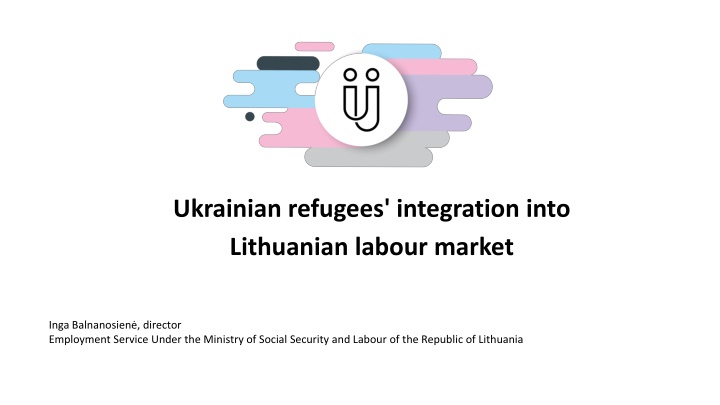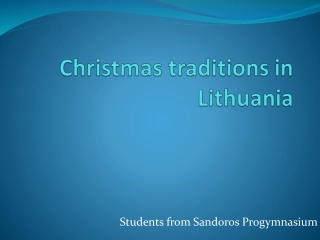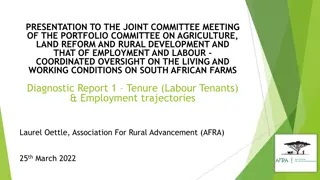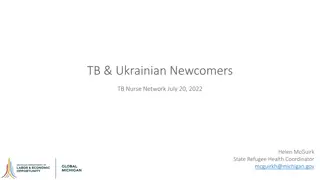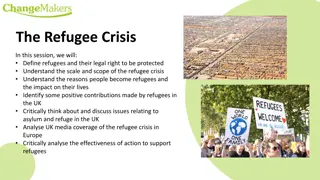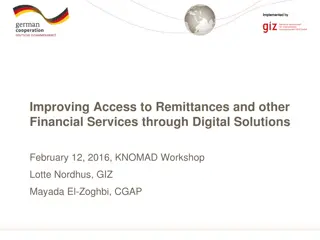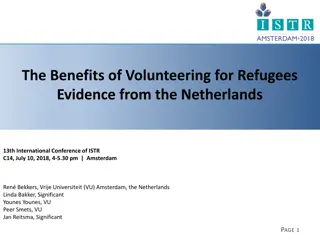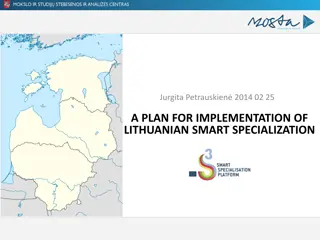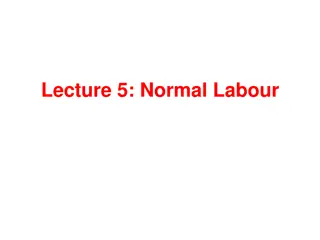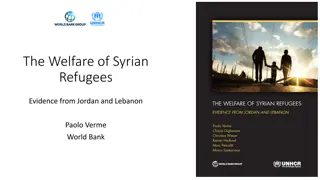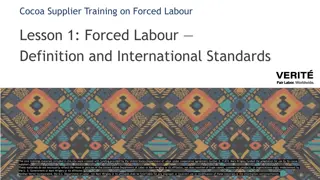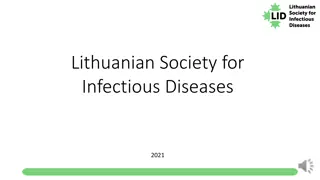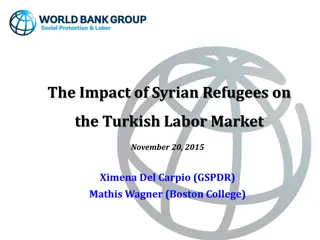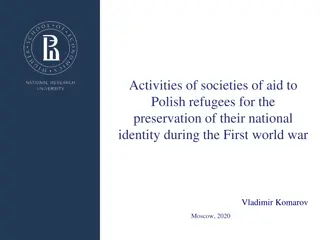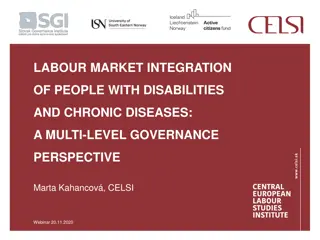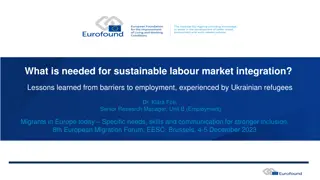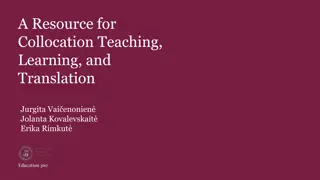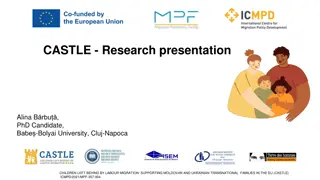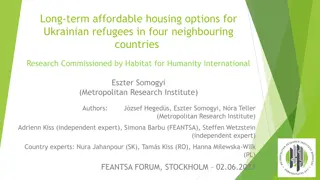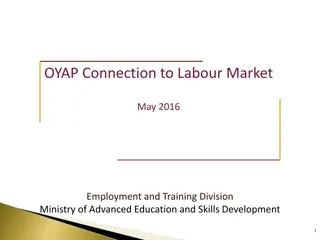Challenges and Integration of Ukrainian Refugees into Lithuanian Labour Market
Ukrainian refugees face various social and professional barriers while integrating into the Lithuanian labour market, including lack of language skills, accommodation issues, health problems, and challenges in diploma recognition. They work in different sectors, with a significant number in transportation, manufacturing, and construction. Efforts are being made to assist their integration, but concerns remain about language courses and specialized training for different professions.
Download Presentation

Please find below an Image/Link to download the presentation.
The content on the website is provided AS IS for your information and personal use only. It may not be sold, licensed, or shared on other websites without obtaining consent from the author.If you encounter any issues during the download, it is possible that the publisher has removed the file from their server.
You are allowed to download the files provided on this website for personal or commercial use, subject to the condition that they are used lawfully. All files are the property of their respective owners.
The content on the website is provided AS IS for your information and personal use only. It may not be sold, licensed, or shared on other websites without obtaining consent from the author.
E N D
Presentation Transcript
Ukrainian refugees' integration into Lithuanian labour market Inga Balnanosien , director Employment Service Under the Ministry of Social Security and Labour of the Republic of Lithuania
Profile of war refugees from Ukraine From the beginning of war 83,9 thousand refugees from Ukraine came to Lithuania. 55,2 thousand of them are provided with temporary living permit. 0 - 6 y.o. 7 109 7 - 17 y.o. 19 555 18 - 69 y.o. 54 706 70+ y.o. 2 524 * Data from State Data Agency
Number of employed Ukrainians is increasing Ukrainian refugees registered as unemployed, thousand Ukrainian refugees employed, thousand (at the end of the period) 29.9 28.8 26.6 24.0 21.5 18.2 13.2 3.8 3.1 3.9 20.0 7.1 2022 2023 Q1 Q2 Q3 Q4 Q1 Q2 Q3 Q4 2022 2023 Registered over the period of time Registered at the end of the period High-skilled Medium-skilled Low-skilled
War refugees from Ukraine work in different sectors 30 thousand refugees from Ukraine work in Lithuania in January 2024 (under employment contracts). Employment by economic activity, percent 26.4% Transportation and storage Every fourth is employed in transportation (7.9 thousand), every fifth in manufacturing companies (6.4 thousand) or in construction (5.9 thousand). 21.5% Manufacturing 20.0% Construction Most of refugees are employed for medium-skilled jobs (22 thousand). Accommodation and food service activities 8.9% One of ten refugees are employed for highly qualified job (2.5 thousand). 6.6% Wholesale and retail trade Administrative and support service activities 5.9% Employment by qualification 2.4% Education 8% 18% Highly qualified jobs Human health and social work activities 1.9% Agriculture, forestry and fishing Medium qualification jobs 1.4% 1.4% Other service activities 74% Unskilled jobs
Ukrainians face both social and professional barriers while integrating into the labour market Social Professional Care responsibilities (children, elderly) lack of language skills Accommodation problems lack of education and/or qualification Health (including mental health) problems, disabilities and emotional vulnerability Barriers of recognition of diplomas or qualifications Stereotypes regarding gender and different ethnic groups Unsatisfactory working conditions (heavy workload, low pay, schedule) The cultural difference Mobility problems Willingness to leave for Ukraine as soon as possible/Unclear future plans The debate on the challenges posed by language barriers is intensifying: 1. Contact Lithuanian language courses for foreigners are more often organized in major cities of the country. Distance education is inefficient and problematic for older foreigners. 2. When organizing Lithuanian language courses, we face the problem of helping a person to reach the highest possible level of Lithuanian language proficiency. 3. The offer lacks special courses aimed at people working in relevant professions (engineers, electricians, doctors, medical personnel, etc.).
Participation of Ukrainians in ALMPs increased in 2023 compared to 2022 6,8 thousand of Ukrainians participated in ALMP s The highest numbers of participants in supported employment 48,6 % and support for learning 48,5 % 2,8 thousand Ukrainians studied Lithuanian language. Integration rate into labour market after 6 months - 63,7 % Participants 4280 2862 2524 1929 1375 435 160 43 ALMP Support for learning Supported employment Support for Mobility 2022 2023
PES strives to integrate Ukrainians into the labour market operational political decisions "A job seeker, living in Kaunas, contacted the Employment Service for help finding a job based on the available qualifications and finding a place to live in Plunge. The cooperation with the municipality went well and the person started working in another county, a job with a higher qualification." clear working procedures and internal communication in the Employment Service Employment Service services adapted to individual needs continuity of cooperation with employers Kaunas-Plung communication, assistance, advice to Ukrainians, enabling them to make the most appropriate decisions "Persons with medical qualifications are directed to the district municipal hospital for interviews. Employed more than 10 persons. All of them are learning Lithuanian." close cooperation with the country's municipalities, providing services adapted to individual needs Employed persons successfully remain in their existing workplaces after the non formal adult education tool - Lithuanian language courses. Naujoji Akmen Survey of Ukrainian clients at PES: -97 % felt welcomed in Lithuania -34 % associate future plans with stay in Lithuania -89,1 % had a positive experience with PES and were satisfied with services
Ukrainians find new professional career in Lithuania Yuliia, a pharmacist Michail, an automation engineer Escaped from the bombed Charkiv. Now works in medicine producing pharmacy. Was proposed a job in Ukrainian capital company in Klaip da Started a new career in Lithuanian among his countrymen. Ina, a nurse Halyna, a midwife Escaped bombardment and came to a small-town Venta. Employed as a nurse assistant in hospital while learning Lithuanian language. Decided to stay in iauliai and change her profession from midwife to a bus drivem. Employment Service is financing her retraining. Family of doctors With the help of Lithuanian PES all were employed according to their qualifications: gynecologist, odontologist and children traumatologist. Despite heart breaking experiences and challenges, the number of Ukrainian success stories of integration into the labour market of Lithuania is increasing.
